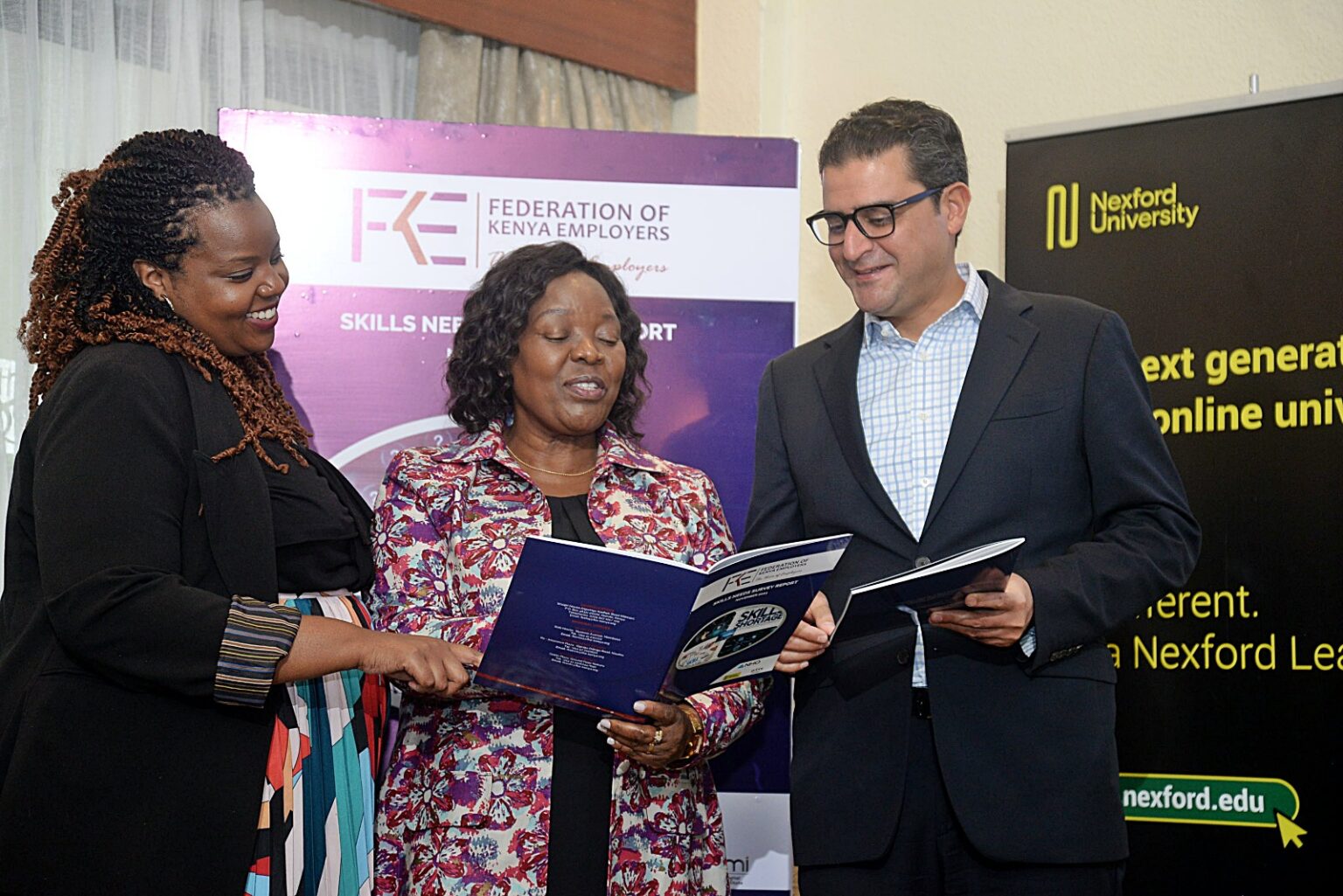- According to a new report, information Technology tops the list of the major skills demanded by Kenya’s job market.
- The new study by the Federation of Kenya Employers indicates ICT tops the list at 28.4 per cent, followed by finance & business management at 27.4 per cent, engineering at 19.2 per cent, transportation, distribution and logistics at 18.6 per cent, and legal at 18.2 per cent.
- Areas with ICT competence demand include the ability to communicate and collaborate on digital platforms at 37.6 per cent, followed by the use of electronics, machine ware, smart components, and communication technology at 34.5 per cent and digital security at 33 per cent.
Information Communication Technology (ICT) tops the list of the major skills demanded by Kenyan employers, according to a new report. The new study carried out by the Federation of Kenya Employers (FKE) indicates information technology tops the list at 28.4 per cent, followed by finance & business management at 27.4 per cent, engineering at 19.2 per cent, transportation, distribution and logistics at 18.6 per cent, and legal 18.2 per cent.
According to the report, areas where ICT competence was needed included the ability to communicate and collaborate on digital platforms at 37.6 per cent, followed by the use of electronics, machineware, smart components, and communication technology at 34.5 per cent and digital security at 33 per cent.
ICT and other in-demand skills in Kenya’s job market
“These fields require undergraduate degree at 43.8 per cent, and technical and vocational education and training (TVET) at 34.9 per cent. Workers with only secondary education are mostly in demand in public safety, corrections & security career fields (4.8 per cent) and arts & recreational service (3.1 per cent),” the report states.
According to the report, the top TVET skills demanded by the respondent enterprises are in transport and logistics at 21.3 per cent, electrical at 21.1 per cent), and building and construction at 18.2 per cent ).
The most demanded engineering skills by enterprises are computer and software engineering at 30.7 per cent, electrical and electronics engineering (27.4 per cent and mechanical and production engineering at 25 per cent.
The most demanded social skills were effective communication at 49.1 per cent, critical thinking at 41.7 per cent, teamwork at 25.7 per cent and time management skills at 23.4 per cent.
“Most of the enterprises studied (73.1 per cent) used training to fill the skills gap in their enterprises. These trainings were offered in collaboration with other organizations in capacity building space,” the report explained.
Read also: People First: Why Protecting your employees is vital in today’s climate!
Green Shift
Kenyan employers are also interested in the green shift and green competence as enterprises surveyed indicated they had plans to make products/services more climate/environmentally friendly, as indicated by 39.3 per cent.
“There were concrete changes made as a consequence of standards/requirements or expectations on a green shift as indicated 26.1 per cent and that enterprise services/products were expected to increase as a consequence of the green shifts as indicated by 25.7 per cent. As such, the enterprises were considered to be moving towards greenshift,” the survey noted.
Some competencies required for the green shift included leadership competence at 34.2 per cent and the need for skilled worker competence at 33.4 per cent.
The survey confirmed that 20 per cent of the enterprises had difficulty filling vacancies. As such, most respondents resorted to employing job applicants with qualifications lower than they were looking for, as indicated by 9.6 per cent.
The findings revealed that 2 per cent of the positions in the enterprises were hard to fill, with most of the positions being in the Manufacturing sector.
Most hard-to-fill vacancies requiring a TVET skill level are in architecture, building and construction at 2.3 per cent, engineering at 2.3 per cent and transportation, distribution and logistics at 2.9 per cent.
Most hard-to-fill vacancies requiring a master’s degree qualification are in media, communication and public relations at 1 per cent, while those requiring a doctorate qualification are in science and mathematics at 0.4 per cent.
The survey was conducted in partnership with the Africa Digital Media Institute (ADMI) and Nexford University and specifically targeted FKE members across diverse sectors, with a robust participation of 521 enterprises.
“This report sheds light on the critical intersection of education and industry needs. As we navigate the evolving demands of the workforce, it is imperative for educational institutions, businesses, and policymakers to collaborate in shaping an agile and skilled workforce that can drive innovation and sustainable economic growth,” said Laila Macharia, the CEO and co-founder of ADMI.
Study recommendations for skills in demand
The study recommended that TVET institutions be empowered to train more in engineering and information-related areas. This will help bridge the gap in the skills employers demand in these technical areas.
It was also recommended that training institutions should work together to bridge the existing gap between the skills demanded by employers and the courses offered by learning institutions.
By incorporating employers in curriculum development and training through attachments, internships and offering apprentice opportunities, more graduates will have the industry-demanded skills, thus helping in bridging the existing gap.
These partnerships can be strengthened by ensuring that the existing policies on TVET -employers’ partnerships are implemented, and any existing policy gaps strengthened.
“We’re delighted to launch this report today in partnership with FKE and ADMI, it helps move us one step closer to integrating employers within the future of education in Kenya. The report clearly shows that employers need to do more to upskill their own team members and to partner with educators to bridge the gap between educators and employers. Equally, the report shows that while jobs may be limited compared to the size of Kenya’s talent pool employers are still struggling to find qualified talent and that struggle will only increase as technology continues to disrupt industries”, Fadl Al Tarzi, CEO of Nexford University.

